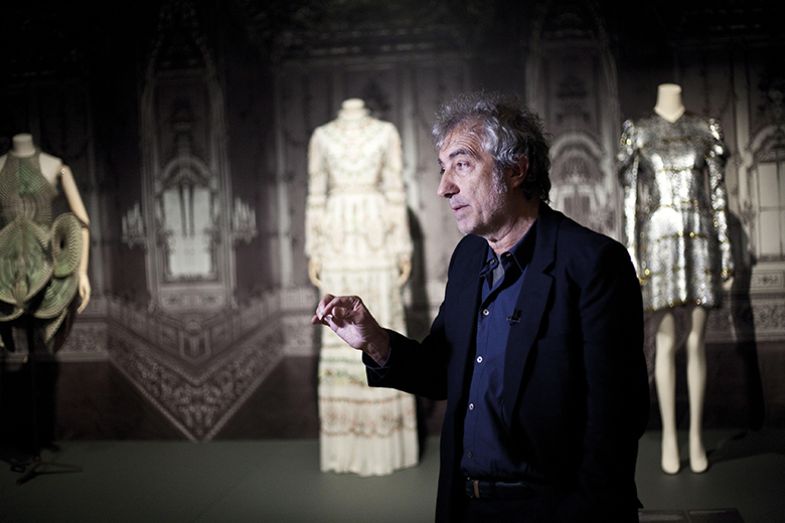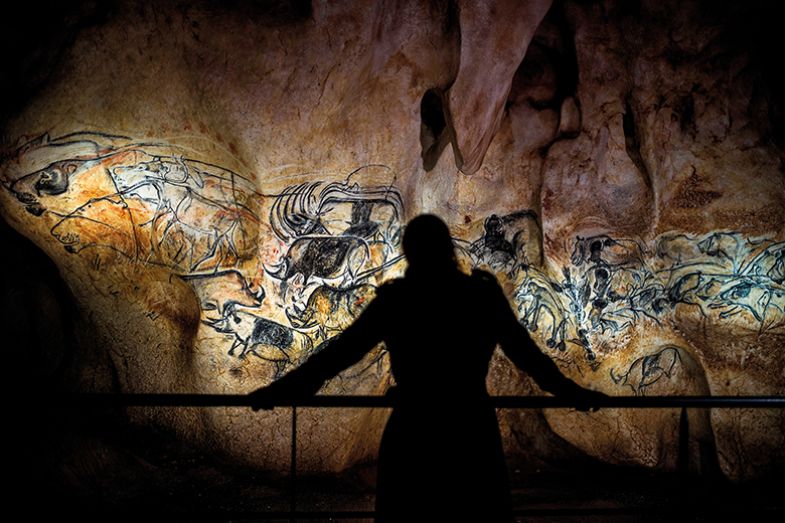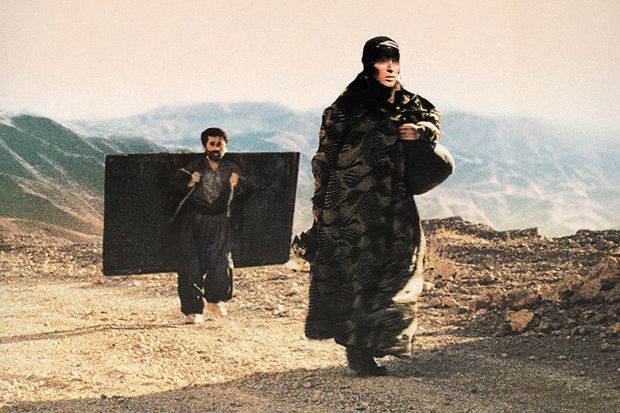In Samira Makhmalbaf’s film Blackboards (2000), a group of men trek through the mountainous regions of Iranian Kurdistan, stooped under the huge blackboards strapped to their backs. They are itinerant teachers looking for pupils, anyone who will pay them for lessons with money or food.
“Do you know how to write? Would you like to learn?” they say to everyone they meet in earnest, badgering tones. In mountain villages, where the locals hide inside their houses, they shout: “Open the windows. Answer me! I’ve come a long way to teach your children to read and write.” Everyone ignores them or tells them to go away.
As far as I know, teachers in Kurdistan do not roam around with blackboards on their backs, hawking their wares. The blackboards in the film are a conceit, a surreal and beautiful metaphor for the inbuilt asymmetry of education – for how often it rests on offering something as yet unquantifiable to an audience of the apathetic or unconvinced.
I am starting to wonder, as a humanities teacher in a UK university, if this will be my fate – wandering the streets with a laptop and data projector, offering up lectures on Shakespeare’s sonnets or the contemporary novel to random pedestrians. Every week brings news of more planned redundancies and course closures in my field. The hollowing-out of departments by voluntary severance and early retirement is happening more widely, under the radar. The cuts are coming mostly in the post-1992 universities and others outside the research elite.
What adds to the teachers’ desolation in Blackboards is that they are such terrible salesmen – so shrill and needy in their pitches to potential pupils. The humanities have a similar problem. We urgently need a better story that explains the worth of what we do. And yet, as the writer and psychotherapist Adam Phillips argues, often we fall back on idealised justifications of the humanities that “betray, in their vehemence and the nature of their claims, a lack of confidence”.

They make it seem, as Phillips says, as if we are defending a religion or a local hospital under threat of closure. We oversell the humanities as impactful, transformative and game-changing in ways that don’t sit well with the quiet, patient, accretive methods of the scholarship. Or we claim, without much evidence, that the humanities have cornered the market in “critical thinking”, or that studying them makes us more empathetic and humane. If I were a scientist, I would be irritated by the suggestion that my work did not inspire the same kind of emotional literacy. A geneticist or neuroscientist need value human life and consciousness no less for being able to glimpse their makeup in DNA’s double helix or the lump of jellified fat and protein inside our skulls.
We shouldn’t need to overclaim for the humanities like this, because they explore something essential about the human species. We are interpretive animals. “People live by narrative,” Boris Johnson said when being interviewed for a profile in The Atlantic last year. “Human beings are creatures of the imagination.” On this, at least, we can agree. Making shared meanings is almost as vital to us as our animal needs for food, water, shelter and sleep. Every human-made system – literature, art, music, religion, money, the law, the constellations of stars – demands that we swallow its story. The success of our species derives from our ability to weave these intersubjective webs of meaning.
The price we pay is to become overly immersed in these invented worlds, so that it is hard to break their spell and embrace other realities. In Marilynne Robinson’s words, “We live on a little island of the articulable, which we tend to mistake for reality itself.” The humanities show us how to read, with imaginative sympathy and watchful scepticism, the stories we tell ourselves. They thwart our tendency to impose a false neatness and coherence on our lives.
This process is sometimes awkward and uncomfortable. The cuts to humanities departments have coincided – and not coincidentally – with newspapers and politicians caricaturing these departments as hotbeds of woke ideas and resentment-filled identity politics. When the humanities question a society’s well-worn and consoling narratives about itself, it can unsettle and annoy people. Buying into collective meanings is a bit like riding a symbolic bicycle. If we think too much about working the pedals and keeping our balance, we fall off. Falling off a bicycle is painful and makes us look foolish. So most of the time we prefer not to explore too closely the meanings that undergird our activities. We just carry on pedalling.
It is hard to quantify what would be lost if the humanities weren’t there. They don’t come up with solutions like the sciences do, in the form of, say, new vaccines or alternative sources of energy. They can’t produce anything like the beautiful, elegant economy of a mathematical equation – the formula that explains so much with as little effort as possible. Science moves forward with these breakthroughs and discoveries; but the humanities are cumulative, not progressive. Every text examined in the humanities is trying to solve differently the riveting but essentially unsolvable puzzle of being human. Every text is as fascinatingly flawed, as infinitely granular, as limitlessly miscellaneous, as the human being who made it.

So the humanities pursue not solutions but the more careful elaboration of problems. They layer on meaning and erudition, continuing that conversation begun tens of thousands of years ago when Homo sapiens went deep into caves to blow ochre dye on the walls. The results are incremental and hard to measure. Scholars and students just gradually become better writers, readers and thinkers, and more subtle sense-makers of their own and other people’s lives. Bit by bit, the humanities deepen and enrich the act of collective meaning-making.
These slow-burn, incalculable effects mean that the loss of the humanities would be rather like the loss of habitat in the natural world – something profound and far-reaching that occurs piecemeal and unnoticeably, while our attention lies elsewhere. Most people don’t miss that wildflower meadow now that it has become a motorway, especially if they didn’t know the meadow was there in the first place. They didn’t notice the number of migrating birds or pollinating insects declining, because the birds and insects didn’t announce their departure and we were looking the other way. But something precious was lost, all the same.
Of course, people have foretold the death of the humanities for decades. “The humanities are at the cross-roads, at a crisis in their existence,” the historian J. H. Plumb wrote in his introduction to the Pelican book Crisis in the Humanities in 1964. The humanities survived, and indeed student enrolments remained healthy for the next half century. True, the share of students doing the humanities has been falling in UK universities since 2012, in favour of the sciences. This is probably a result of the relentless focus on STEM in schools, and austerity and higher tuition fees driving more career-specific choices. But the fall is not precipitous and might reverse at some point, as subjects go in and out of student fashion.
The problem is not some existential threat to the humanities in general, but to their future outside the elite institutions. What we are seeing now is the long playing out of the government’s decision in 2013 to end student number controls in England. Since this came into force in 2015, the high-ranking universities have made up shortfalls in humanities admissions – or over-recruited in an area seen as cheap to resource – by taking students who would have previously gone elsewhere.
As stories about closures and redundancies in the humanities have broken, there has been much criticism of the predatory student recruitment practices of the Russell Group. But what they are doing is wholly consistent with government policy: student fees and other market mechanisms should increase competition and curb “artificial demand”, even at the cost of the closure of courses and, perhaps, entire universities. Subjects like languages, literature and history risk becoming the new Classics – a luxury taught in what newspapers now routinely call the “good” universities (not elite, or even best, but good).
According to the rational choice economics that now dominates our public life, a university education is a “disutility” – the sacrifice of one’s time and convenience for money. What matters is not so much the learning itself but what it leads to. In the crudest metric, this means a job with a salary high enough to justify the expenditure of the tuition fees. The government’s definition of a “good” university course is one where the size of its fees correlates with the size of salary a graduate of that course can command.
This inevitably favours the elite universities, especially since, with a greatly increased stock of graduates, employers tend to use university rankings as a short cut when sifting job applications. Those who dismiss humanities courses at post-1992 universities as “low value” assume, or at least pretend to assume, that the marketisation of universities established its own natural hierarchy of winners and losers. All it did was favour the entrenched reputations of the elite institutions and the tendency for social hierarchies to be self-fulfilling.
The current political orthodoxy is that social mobility is best achieved by the meritocratic rationing of elite education – by getting more students from poor or modest backgrounds into Oxbridge and other Russell Group universities. There is no evidence that this approach is increasing social mobility. On the contrary, education has been a key driver of what sociologists call “effectively maintained inequality”: the tendency for more affluent families to strategise and over-exploit opportunities. Middle-class children have benefited from inherited social and cultural capital, private education or tutoring, their parents buying into good school catchment areas, and the unconscious rewarding of their social confidence and ease. This gives them a much better shot at attending the elite universities. Although participation in higher education has risen hugely in the UK since the early 1990s, it continues to be sharply stratified according to race and class. The much smaller increase in the number of working-class and black and ethnic minority students has been heavily concentrated in the post-1992 and non-Russell group universities.
If the humanities are driven out of these universities, these are the students who will disproportionately miss out on them. They will be the ones steered away from the “low value” degrees towards learning a trade or doing a more vocational course. Meanwhile Oxbridge humanities graduates – including the prime minister, his former chief adviser Dominic Cummings and three members of Johnson’s current Cabinet (Stephen Barclay, Kwasi Kwarteng and Jacob Rees-Mogg) – continue to fill positions of power and influence. But then our hierarchised UK university system, as a former colleague once said to me, is the last bastion of socially acceptable snobbery.
Why does this unequal access to the humanities matter? It matters because the humanities are, ultimately, about hope and possibility. They began in the creative ferment of the Renaissance, with its rediscovery of the secular accomplishments of classical civilisation. The studia humanitatis lauded the fullness of human potential. The humanities show that people, with all their imperfections, fragilities and self-deceptions, are beautiful and irreplaceable beings of incalculable worth. They show that human beings are more than simply human capital. They show that every person has a deep reservoir of potential that we can’t begin to fathom until it is fulfilled, because it will somehow be tied up with this messy, uncontainable human impulse to make our lives meaningful. The humanities are not for everyone, but everyone should have an equal chance to study them.
As for the humanities scholars under threat of redundancy, they cannot easily retrain as computer coders or ballet dancers. For many, their working lives will be over prematurely. Those left standing will be unsure what the future holds – even if, like Robert Burns addressing the mouse, they “guess and fear”. They are becoming acquainted with the precarity that new PhDs and early career scholars suffer routinely.
This is especially unfortunate because, while the marketised university feeds off flux and uncertainty, humanities scholarship feeds off security and confidence. Humanities scholars know more than anyone that people only thrive inside self-spun webs of meaning. Humanities work requires huge investments of time and effort in getting to know one’s material intimately, keeping the faith that others will find this worthwhile and that it will form one more slender thread in the web of meaning. We have to keep telling ourselves that, just because what we do is slowly accruing and often too ineffable to turn into data, that doesn’t mean it doesn’t exist, or doesn’t matter. When we start to question that faith, it corrodes our focus, motivation and well-being.
All we can do is carry on with the work. In Emily St John Mandel’s 2014 novel Station Eleven, a nomadic troupe of actors perform Shakespeare to pockets of survivors from a global pandemic that has killed most of the world’s population. The lead caravan of their troupe bears the legend Because survival is insufficient.
I have taken to incanting this line, which Mandel got from an episode of Star Trek, as a justification for the humanities. It is not enough just to live. We need to know that our lives, with all their griefs and joys, are meaningful. Exploring life’s meanings more carefully could never be a waste of time, even if all the political mood music at the moment tells us otherwise. The humanities matter and we are right to keep believing in them. Survival is insufficient.
Joe Moran is a professor of English and cultural history at Liverpool John Moores University.
Register to continue
Why register?
- Registration is free and only takes a moment
- Once registered, you can read 3 articles a month
- Sign up for our newsletter
Subscribe
Or subscribe for unlimited access to:
- Unlimited access to news, views, insights & reviews
- Digital editions
- Digital access to THE’s university and college rankings analysis
Already registered or a current subscriber? Login










